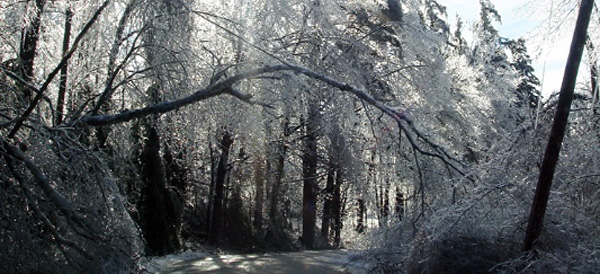
The hum you hear in the background is a propane generator giving me just enough juice to charge a laptop and brew some coffee–day four in life without power in post-ice storm New England; telephone and power poles, power lines, and every other tree, all epically askew, if not exploded altogether. All creepy-pretty, for the first 72 hours, when everything was packed in light-refracting ice. But now the temperature is up and the ice has melted and gone thudding to the ground. Enter the days of mud.
Naturally one’s thoughts turn to fiction, particularly those fictions that put disasters at their center. I do not mean, of course, disaster porn like The Towering Inferno or Titanic. Rather, stories that borrow the power of actuality and loan it to fiction. The external disaster–the flood, the fire, the tsunami, the ice storm–artfully employed, can intensify and clarify a character or characters’ inner misadventures.
Of course, the fiction writer temped to make such a loan puts himself at risk: it’s very easy to overextend the enterprise, to push it or be pushed by it. Imagine a short story called, say, “Powerless”. Would I even need to sketch the plot? Probably not. And yet the temptation to have the outer mirror the inner is old, and its rewards are rich. The Greeks were good at maintaining a balance, keeping the usefully clear from becoming the terribly obvious. Frogs, clouds, plagues: Nature in its varied forms arrived punctually and dramatically to inform the human state of things, to allow the literal to resonate unto the metaphorical.
Such a balance is, I’m sure, a challenge to maintain. Too easily, the weight of the natural can overwhelm the actual, can make fiction merely metaphoric, starved of literality. Less riskily, moments in nature can be used to inform moments in fiction. From Eudora Welty’s story “The Wide Net:”
Then the light changed the water until all about them the woods in the rising wind seemed to grow taller and blow inward together and suddenly turn dark. The rain struck heavily. A huge tail seemed to lash through the air and the river broke in a wound of silver. In silence the party crouched and stooped beside the trunk of the great tree, which in the push of the storm rose full of a fragrance and unyielding weight. Where they all stared, past their tree, was another tree, and beyond that another and another, all the way down the bank of the river, all towering and darkened in the storm.
































































































